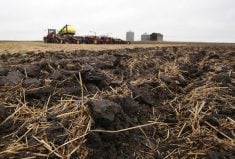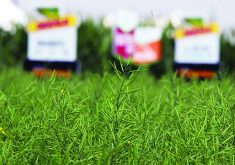Manitoba producers might have caught a break from some of the bugs that have been threatening early seeded crops.
John Gavloski of Manitoba Agriculture feels that the cooler, wetter conditions of the last two weeks will have slowed the appetites of flea beetles.
He said the weather might help young canola plants reach the three or four true leaf stage before the bugs can get back to dining, which will leave the plants enough leaf to continue on with rapid growth stages.
Seeding that took place a month ago will no longer have the protection of seed treatments when it comes to flea beetles, so monitoring plants is important at this point.
Read Also

Biofuel sector happy with federal budget
Advanced Biofuels Canada says new Biofuel Production Incentive is a lifeline until CFR amendments are in place.
Cutworms are present in high populations in the south, with corn fields near Niverville, Starbuck and Eden receiving insecticide applications.
The pest is a night feeder, so control applications are most effective when done late in the day.
Wireworms are showing up in wheat crops near Crystal City and Cartwright, but Gavloski said damage reports have been lower than usual this year.
Diamondback moths are appearing in traps in southern and eastern regions, but weather and pest populations will determine how larva numbers develop later in the year.
Aster leafhoppers are present in the region this year and are feeding on cereal sap.
The insect itself isn’t much of an issue, but it can be a serious disease vector for aster yellows in cereal, flax, sunflowers and canola.
They are the greatest threat to horticultural crops.
For more information, visit www.gov.mb.ca/agriculture/crops/insects.














